Unit4 A good read. Grammar 课件 (共47张PPT)
文档属性
| 名称 | Unit4 A good read. Grammar 课件 (共47张PPT) |
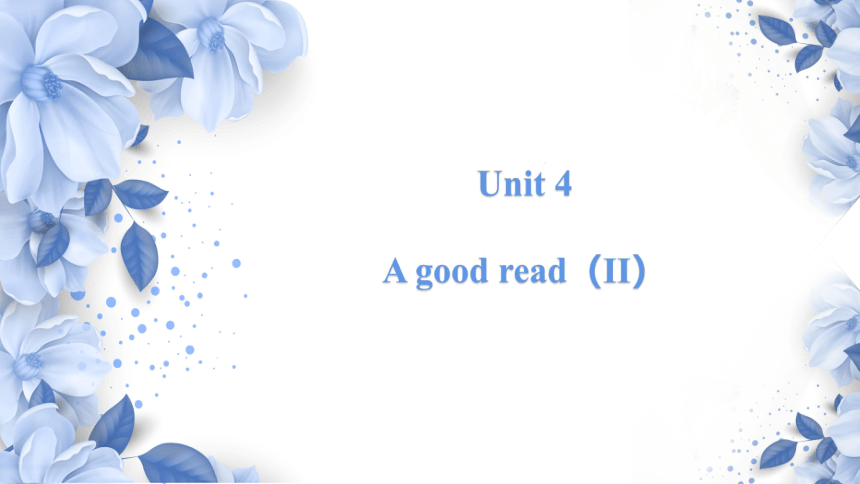
|
|
| 格式 | pptx | ||
| 文件大小 | 7.4MB | ||
| 资源类型 | 教案 | ||
| 版本资源 | 牛津译林版 | ||
| 科目 | 英语 | ||
| 更新时间 | 2022-06-04 17:55:45 | ||
图片预览

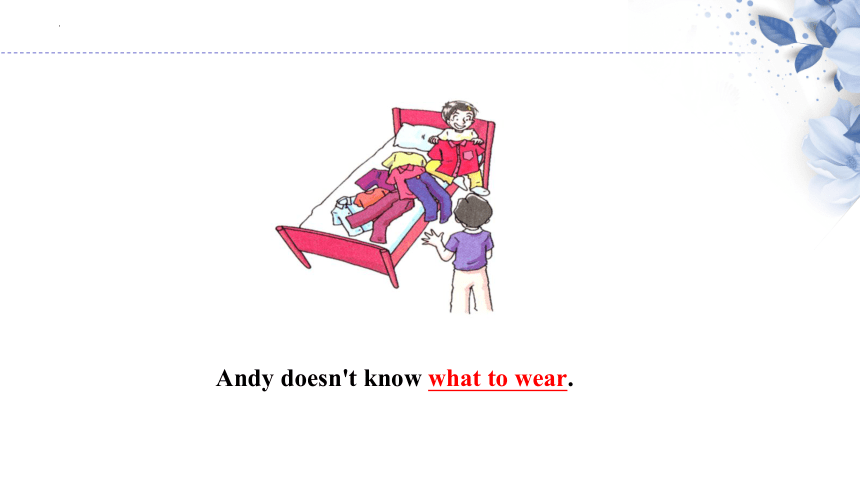
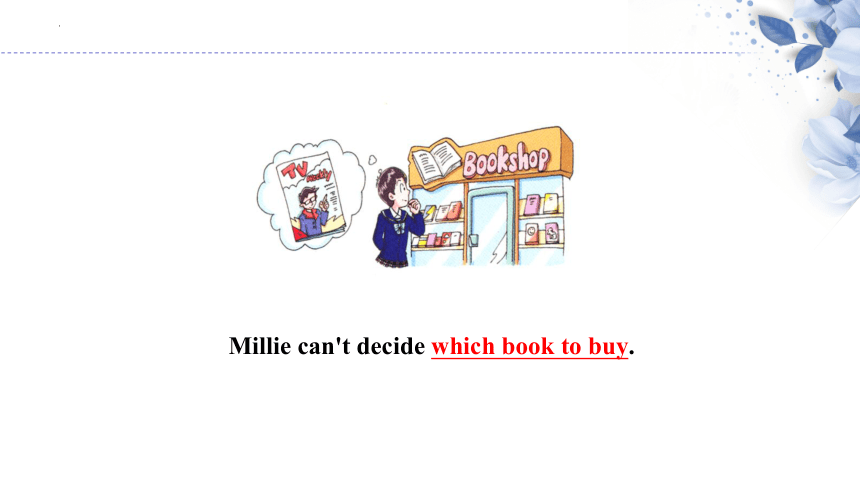
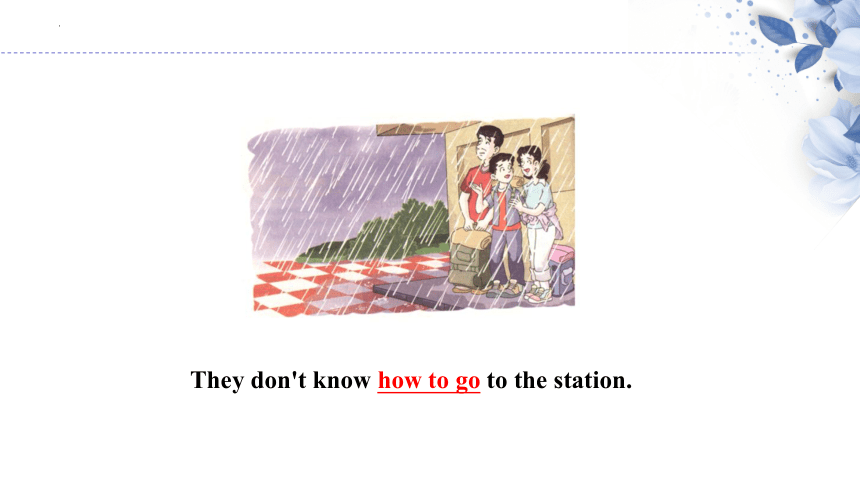
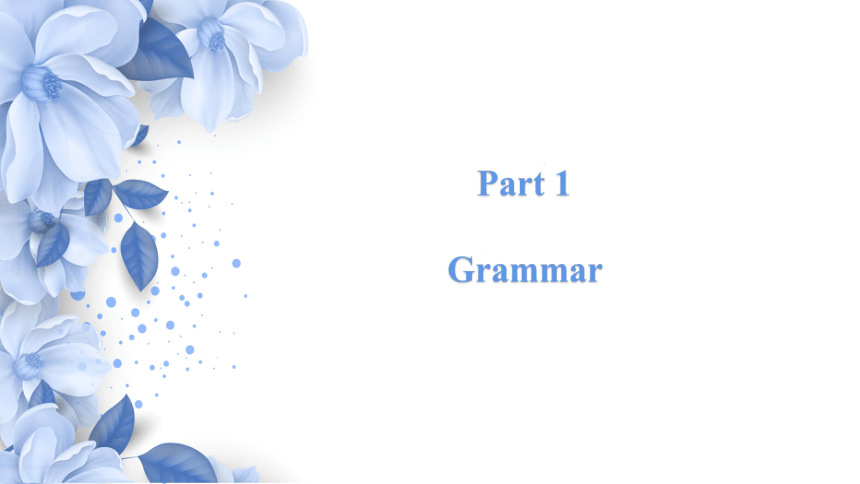
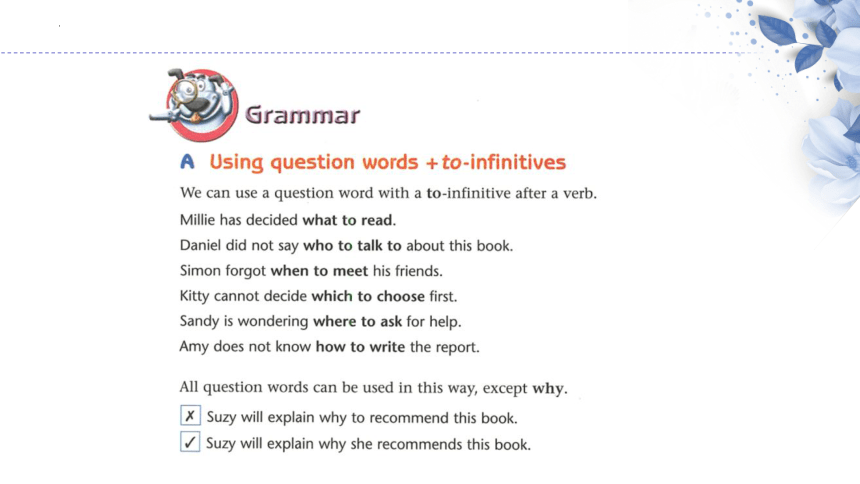
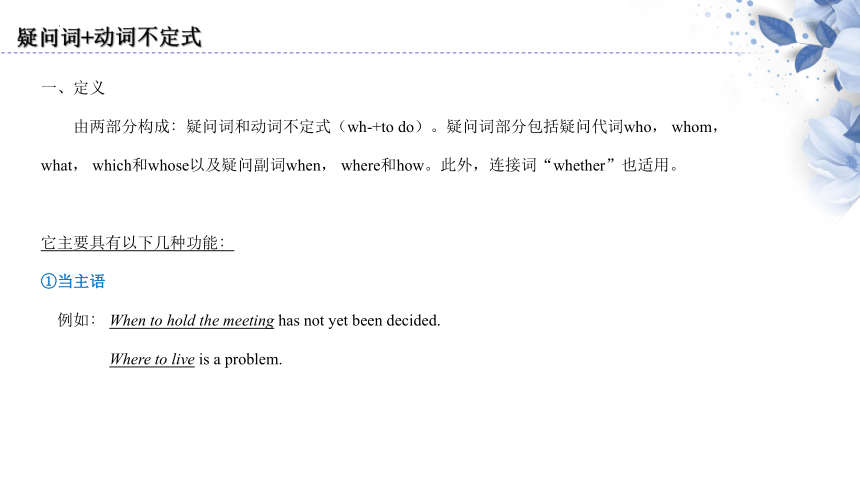
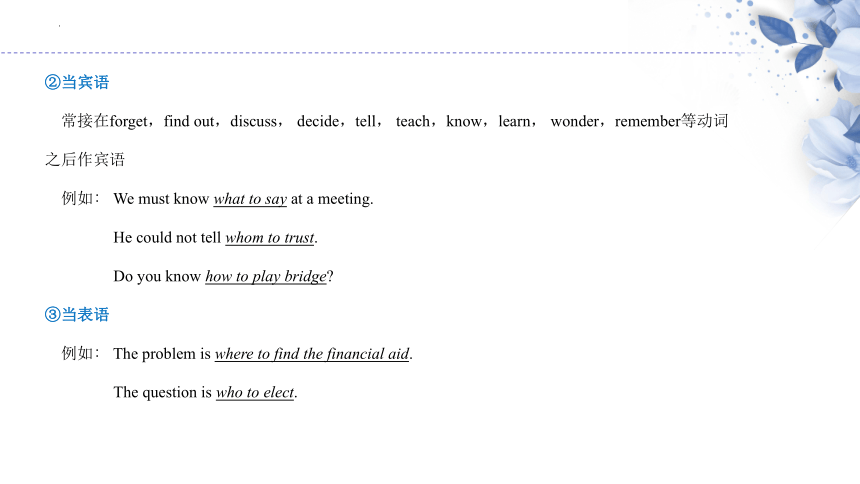
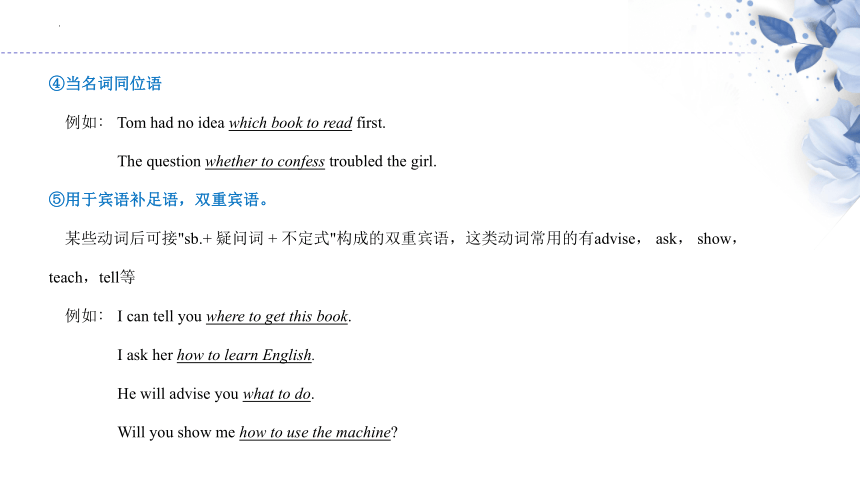
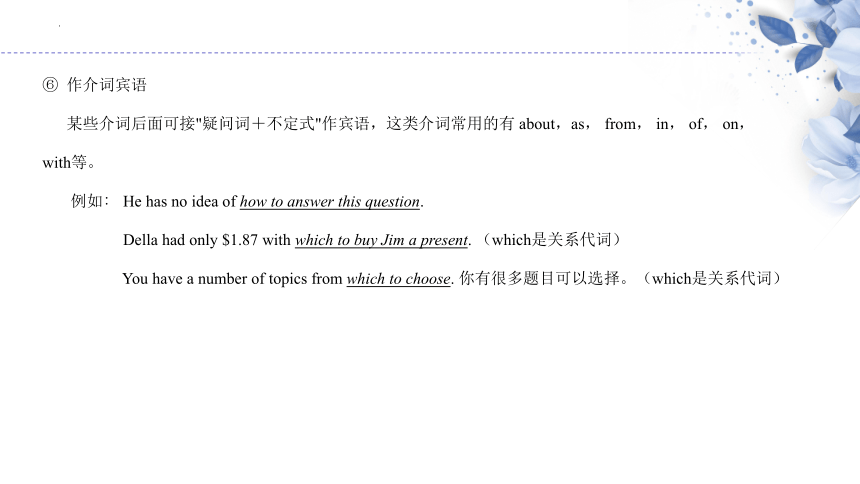
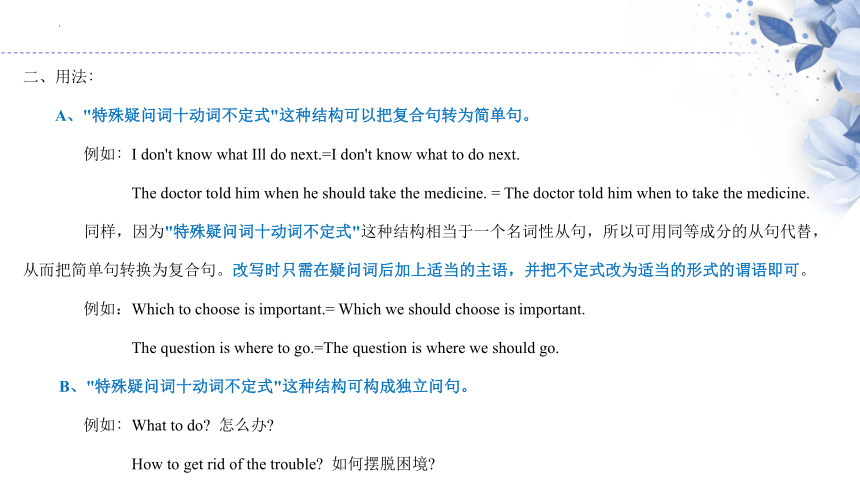

文档简介
(共47张PPT)
Unit 4
A good read(II)
Andy doesn't know what to wear.
Millie can't decide which book to buy.
They don't know how to go to the station.
Part 1
Grammar
一、定义
由两部分构成∶疑问词和动词不定式(wh-+to do)。疑问词部分包括疑问代词who, whom, what, which和whose以及疑问副词when, where和how。此外,连接词“whether”也适用。
它主要具有以下几种功能∶
①当主语
例如∶ When to hold the meeting has not yet been decided.
Where to live is a problem.
疑问词+动词不定式
②当宾语
常接在forget,find out,discuss, decide,tell, teach,know,learn, wonder,remember等动词之后作宾语
例如∶ We must know what to say at a meeting.
He could not tell whom to trust.
Do you know how to play bridge
③当表语
例如∶ The problem is where to find the financial aid.
The question is who to elect.
④当名词同位语
例如∶ Tom had no idea which book to read first.
The question whether to confess troubled the girl.
⑤用于宾语补足语,双重宾语。
某些动词后可接"sb.+ 疑问词 + 不定式"构成的双重宾语,这类动词常用的有advise, ask, show, teach,tell等
例如∶ I can tell you where to get this book.
I ask her how to learn English.
He will advise you what to do.
Will you show me how to use the machine
作介词宾语
某些介词后面可接"疑问词+不定式"作宾语,这类介词常用的有 about,as, from, in, of, on, with等。
例如∶ He has no idea of how to answer this question.
Della had only $1.87 with which to buy Jim a present. (which是关系代词)
You have a number of topics from which to choose. 你有很多题目可以选择。(which是关系代词)
二、用法∶
A、"特殊疑问词十动词不定式"这种结构可以把复合句转为简单句。
例如∶I don't know what Ill do next.=I don't know what to do next.
The doctor told him when he should take the medicine. = The doctor told him when to take the medicine.
同样,因为"特殊疑问词十动词不定式"这种结构相当于一个名词性从句,所以可用同等成分的从句代替,从而把简单句转换为复合句。改写时只需在疑问词后加上适当的主语,并把不定式改为适当的形式的谓语即可。
例如:Which to choose is important.= Which we should choose is important.
The question is where to go.=The question is where we should go.
B、"特殊疑问词十动词不定式"这种结构可构成独立问句。
例如∶What to do 怎么办
How to get rid of the trouble 如何摆脱困境
三、按照英语语法的习惯,疑问副词why 后不直接跟动词不定式
误∶I don't know why to choose that dictionary.
正∶ I don't know why you must choose that dictionary.
但它可以接不带to的动词不定式,即动词原形,构成why do sth./ why not do sth.
肯定形式是表示某动作是不必要的或没有意义的,而否定形式是表示向某人提建议和表达看法,相当于祈使句。
例如∶Today is Sunday. Why not go out to relax yourself
Why pay more at other shops We have the best value.
完成下列句子。
1.I don't know what to say at the meeting(在会上说什么).
2.Can you tell me where to buy this book(在哪里能买到这本书)
3.When and where to hold the meeting(在何时何地召开这会议)hasn't been decided yet.
用how, which,what, when, where填空。
1.When I go into the clothes shop, I always can't decide which one to buy.
2.My grandfather doesn't know how to use a computer.
3.--Will you please show me how to drive a car
-- Yes, of course. Now let me tell you what to do first.
4.I will tell Lucy when and where to meet.
一、must与 have to 的区别
情态动词must和have to都有"必须"的含义,它们的用法如下∶
(一)must"必须"、"应该"的用法∶
1. must 表示"必须"、"应该"。
例如∶ We must protect our environment.
Everyone must obey the rule.
2. must的否定形式must not表示“不应该”、“禁止”、“不准”。语气比较强烈。
例如:You mustn't speak like that.
You mustn't be late for school.
3. 在回答must的问句时,肯定形式用must来回答,但否定形式用needn't 或don't have to来回答。而不用mustn't来回答。
例如∶--Must I be home before 8 o'clock
--No, you needn't./No, you don't have to.
--Yes, you must.
must与have to的用法
(二)have to表示“必须”、“不得不”
例如∶He has to stay in bed for 3 or 4 days.
We will have to get up early tomorrow.
补充have got to是 have to的口语形式。
例如∶I've got to leave for Nanjing.
*Must与 have to的区别∶
①must表示的是说话人的主观看法,而have to则表示的是客观需要。
②must一般只有现在时,而have to有更多的形式。
例如∶I must go now. (主观看法)
My mother is ill, so I have to go now. (客观需要)
*Have to与 have got to的区别∶
have got to虽然是have to的口语形式,但二者在用法上有严格的区别∶
①have to的前面还可以用情态动词或助动词,而have got to却不可以;
②have to的否定形式为don't/doesn't /didn't +have to,疑问式为Do/Does/Did +主语+ have to..
而 have got to的否定形式是在have后加not,疑问式把have提前。
①We don't have to go home. ①Do you have to go home
②We haven't got to go home. ②Have you got to go home
Part 2
Integrated skills
a great success.
success此处用作可数名词,意为"成功的人或事",success也可作不可数名词,意为"成功",其反义词为failure"失败" 例如∶ The meeting is a success.
①succeed用作不及物动词,意为"成功",后常跟in doing sth. 例如∶ He succeeded as a doctor. ②successful形容词,意为"成功的" 例如∶ My uncle is a successful businessman.
③successfully副词,意为"成功地" 例如∶ If you work hard,you will get it successfully.
Part 3
Study skills
Transitions between ideas
When we write an article, we have different ways to connect the ideas in it. Here are some common transitions.
1、I can tell her anything because she can keep a secret.
①tell此处用作及物动词,意为"告诉",tell sb.sth.意为"告诉某人某事"
例如∶ Please tel me your phone number again.
tell sb.to do sth.表示"告诉某人做某事",其否定形式为tell sb.not to do sth. 表示"告诉某人不要做某事"
例如∶ Tell him not to be late again.
②because用作连词,意为"因为"
例如∶ He didn't come because he was busy.
辨析∶because,as与since
because 意为"因为" 引导的从句表示直接的原因或理由,常用于回答why引导的问句
as 意为"由于,鉴于" 引导的从句表示十分明显的原因
since 意为"既然" 表示稍加分析可得出来的双方都知道的原因
例如∶ I was late because I was ill yesterday.
As you weren't there, I left a message.
Since everyone is here, let's begin our meeting.
③keep a secret
例如∶ I don't want to let more people know it. Please keep a secret.
2、His story gave me a lot of confidence.
confidence 不可数名词,意为“信心”。
have confidence in 意为“对......有信心”。
例如∶Don't be nervous. You should have confidence in yourself.
confident形容词,意为“自信的,有信心的”常用作定语或表语。
be confident of 意为“对......充满信心”
例如∶There is a confident smile on his face.
3、I also want to travel and have exciting experiences in the future.
①experience在此作可数名词,意为"经历"
例如∶ He has a lot of unusual experiences.
A、experience在此用作不可数名词,意为"经验"。表示做某事的经验时,其后常接in/of doing sth.
例如∶ Mr Wang has so much experience in teaching.
B、experience还可作及物动词,意为"体验,经历"
例如∶ The girl has never experienced sadness.
C、experienced形容词,意为"有经验的"
例如∶ My father is an experienced teacher.
②in the future意为"将来" 例如∶ I will be a doctor in the future.
Part 4
Task
1.I spend over seven hours a week reading different types of books.
我一个星期花费七个多小时的时间来阅读不同种类的书。
over意为“超过、多于”,相当于more than。
e.g. There are over five hundred students in our school. 我们学校有500多个学生。
different types of 意为“不同种类的”。
e.g. There are many different types of books in the library. 图书馆里有许多不同种类的书。
2.….it is just opposite my home.
.…..它就在我家对面。
opposite prep.在…..对面,
与....相反
e.g. The post office is opposite the bank. 邮局在银行对面。
3.My friends give melots of advice on books.
我的朋友们给了我许多有关书的建议。
advice n.建议,忠告,劝告
e.g. I asked the teacher for her advice. 我征求了老师的意见。
give sb. some advice on sth. 给某人一些关于..….的建议
e.g. Could you give me some advice on my plan 你能就我的计划给点儿建议吗
4.They also open up a whole new world to me.
而且他们给我开辟了一个全新的世界。
open up 打开;开发;开辟
e.g. This newjob will pen up a whole new world to me. 这项新工作将为我开辟一个全新的世界。
1.-This physics problem is too difficult. Can you show me________Wang Lin - Sure.
A. what to work it out B. what to work out it C. how to work it out D. how to work out it
【分析】--这道物理题太难了,你能给我演示一下怎么解出它来吗,王林?--好的。
【解答】答案:C 根据四个选项都是不定式,四个选项都给出了一个动词短语是work out,意思是“解出,算出”,如果有代词作宾语的时候,可以把代词放在work和out之间。还有两个词是what和how,what意思是“什么“经常用来做主语或宾语,how意思是“如何“经常对方式进行提问,因为有it来做宾语了,所以就不能用what来作宾语,这时候我们就要选择使用how,因此可知这句话的意思是“这道物理题太难了,你能给我演示一下怎么解出它来吗,王林?“综上所述,故选C。
【点评】首先要掌握这个句子的意思,然后结合具体的题目,就确定正确答案。
【例题讲解】
2. --Excuse me.Could you please tell me________ my car
--Sure.Park it right here.I’Il help you.
A. how to stop B.where to park C. where to stop D. when to stop
【分析】--打扰一下,你能告诉我在哪里停车?--当然可以,停在这里,我帮你。
【解答】答案:B。tell后加“疑问词+动词不定式”结构做宾语,结合Sure.Park it right here.故用where在哪里,故答案是B。
【点评】我们可以用“疑问词+动词不定式“结构做动词的宾语。疑问词包括疑问代词what,which,who和疑问副词how,when,where等。但所有疑问词中,只有why不可以和动词不定式连用。
3.-Excuse me. Could you tell me __________ get to the nearest post office ”
-Sorry, I am new here.
A.how can I B.how I could C. how to D. what I can
【分析】--打扰了,请你告诉我怎样去最近的邮局?--对不起,我是新来这儿的。
【解答】答案:C根据Could you tell me 可知,它后面可以宾语从句或特殊疑问词+不定式做宾语,宾语从句中一般为陈述语序,选项A是疑问语序:又因为Sorry,I am new here.可知,问句应该是“如何到达某处,而不是能做什么”排除D;又因为句子不是叙述过去的动作,所以又排除B:故选C。
【点评】本题考查特殊结构做宾语,注意上下文的联系子的时态问题。
4. Do you know_____ to do with this problem
A. what B.how C. who D. where
【分析】你知道如何解决这个问题吗
【解答】答案∶A。what意思是"什么"疑问代词; how意思是"如何"疑问副词; who意思是"谁"疑问代词;where意思是"在哪里"疑问副词。根据"do with",do _____with 意思是"处理,对付"需要跟宾语,又根据空格前面的词语是know,所以要用what来作do的宾语,how是副词,如果用how 的话,就需要用不及物动词短语deal with。因此可知这句话的意思是"你知道如何解决这个问题吗 " 故选A。
【点评】首先要掌握这几个代词的意思,然后结合具体的题目,就可以确定正确答案。
5.I'm going on a field trip butIhaven't decided ___________.
A. what to do B.to do what C. where to go D. to go where
【分析】我要去郊游,但还没决定去哪儿。
【解答】答案∶C。考查宾语从句。疑问词+不定式。是简单句形式。通常做宾语。what to do做什么。where to go去哪儿。结合语境"我要去郊游,但还没决定 。"。可知,应该是"去哪儿"。选C。
【点评】宾语从句中一般为陈述语序,关于引导词的区分需结合引导词的基本含义及其在句子中所承担的句子成分进行具体分析。宾语从句的时态和主句没有必然的联系,需结合语境具体分析。注意简单句形式。
6.I _______ a gift from my penfriend Peter, but I didn't _________.
A.received; accept B.received; receive C.accepted; accept D.accepted; receive
【分析】我收到了来自我的笔友皮特的一个礼物,但我没有接受它。
【解答】答案∶A 分析句子,结合选项,推测意思是我收到了来自我的笔友皮特的一个礼物,但我没有接受它。第一空表示客观上收到了,用receive,第二空表示主观上的接受,用accept,故选A接收,接受。【点评】解答这类试题时,务必充分理解上下文的语境和前后文的逻辑关系,找到解题的依据,同时正确区分选项的细微差别,准确作答。
7.Please hand _______ your homework ________ time.
A.up; in B.out; on C.on; in D.in; on
【分析】请按时交作业。
【解答】答案∶D。考查介词。第一个空,hand up不搭配。hand out分发。hand in上交。应该是"上交"作业。第二个空,on time按时。in time 及时。应该是"按时"上交作业。选D。
【点评】考查介词用法,这个知识点很广泛,有一些固定用法,需要日常积累,结合语境选择正确介词完成习题。
8. The family________stay at the hotel because it was raining hard.
A. have to B.had to C.need to D. want to
【分析】因为雨下得很大,家人必须待在旅馆。
【解答】答案∶B 分析句子,结合选项,推测意思是因为雨下得很大,家人必须待在旅馆。即这里表示客观上必须待在旅馆,后面时态是一般过去时,故选B必须。A必须,一般现在时,C需要,D想要。
【点评】解答这类试题时,务必充分理解上下文的语境和前后文的逻辑关系,找到解题的依据,同时正确区分选项的细微差别,准确作答。
【课堂练习】
一、单项选择
1. Students in our school_______ know shouting is not allowed in the library.
A.can B.may C.must D.need
2. He will have to _______ his diet because of his serious stomach problem.
A. watching 8 B. watched C. watches D. watch
3. Remember________off the lights when you leave the room,please.
A.to turn B.turning C. turn D.to turning
4. Our teacher often tells us _________ in the river. It's dangerous.
A.don't swim B.not swim C.not to swim D. not swimming.
答案∶CDAC
二、翻译句子
1.她想知道和谁去谈论这本书。
_______________________________________________________________________
2.我们已经给她看接下来要做什么。
_______________________________________________________________________
3.他们正在讨论要带多少钱。
_______________________________________________________________________
4.无论如何,你应该知道在写读书报告前要看一些相关的评论。
_______________________________________________________________________
5.我们必须在图书馆里保持安静。
_______________________________________________________________________
答案∶
1. She wonders who to talk about the book.
2.We have already showed her what to do next.
3.They are discussing how much money to take.
4.Anyway, you should read some reviews before writing the book report.
5.We must keep quiet in the library.
再 见!
Unit 4
A good read(II)
Andy doesn't know what to wear.
Millie can't decide which book to buy.
They don't know how to go to the station.
Part 1
Grammar
一、定义
由两部分构成∶疑问词和动词不定式(wh-+to do)。疑问词部分包括疑问代词who, whom, what, which和whose以及疑问副词when, where和how。此外,连接词“whether”也适用。
它主要具有以下几种功能∶
①当主语
例如∶ When to hold the meeting has not yet been decided.
Where to live is a problem.
疑问词+动词不定式
②当宾语
常接在forget,find out,discuss, decide,tell, teach,know,learn, wonder,remember等动词之后作宾语
例如∶ We must know what to say at a meeting.
He could not tell whom to trust.
Do you know how to play bridge
③当表语
例如∶ The problem is where to find the financial aid.
The question is who to elect.
④当名词同位语
例如∶ Tom had no idea which book to read first.
The question whether to confess troubled the girl.
⑤用于宾语补足语,双重宾语。
某些动词后可接"sb.+ 疑问词 + 不定式"构成的双重宾语,这类动词常用的有advise, ask, show, teach,tell等
例如∶ I can tell you where to get this book.
I ask her how to learn English.
He will advise you what to do.
Will you show me how to use the machine
作介词宾语
某些介词后面可接"疑问词+不定式"作宾语,这类介词常用的有 about,as, from, in, of, on, with等。
例如∶ He has no idea of how to answer this question.
Della had only $1.87 with which to buy Jim a present. (which是关系代词)
You have a number of topics from which to choose. 你有很多题目可以选择。(which是关系代词)
二、用法∶
A、"特殊疑问词十动词不定式"这种结构可以把复合句转为简单句。
例如∶I don't know what Ill do next.=I don't know what to do next.
The doctor told him when he should take the medicine. = The doctor told him when to take the medicine.
同样,因为"特殊疑问词十动词不定式"这种结构相当于一个名词性从句,所以可用同等成分的从句代替,从而把简单句转换为复合句。改写时只需在疑问词后加上适当的主语,并把不定式改为适当的形式的谓语即可。
例如:Which to choose is important.= Which we should choose is important.
The question is where to go.=The question is where we should go.
B、"特殊疑问词十动词不定式"这种结构可构成独立问句。
例如∶What to do 怎么办
How to get rid of the trouble 如何摆脱困境
三、按照英语语法的习惯,疑问副词why 后不直接跟动词不定式
误∶I don't know why to choose that dictionary.
正∶ I don't know why you must choose that dictionary.
但它可以接不带to的动词不定式,即动词原形,构成why do sth./ why not do sth.
肯定形式是表示某动作是不必要的或没有意义的,而否定形式是表示向某人提建议和表达看法,相当于祈使句。
例如∶Today is Sunday. Why not go out to relax yourself
Why pay more at other shops We have the best value.
完成下列句子。
1.I don't know what to say at the meeting(在会上说什么).
2.Can you tell me where to buy this book(在哪里能买到这本书)
3.When and where to hold the meeting(在何时何地召开这会议)hasn't been decided yet.
用how, which,what, when, where填空。
1.When I go into the clothes shop, I always can't decide which one to buy.
2.My grandfather doesn't know how to use a computer.
3.--Will you please show me how to drive a car
-- Yes, of course. Now let me tell you what to do first.
4.I will tell Lucy when and where to meet.
一、must与 have to 的区别
情态动词must和have to都有"必须"的含义,它们的用法如下∶
(一)must"必须"、"应该"的用法∶
1. must 表示"必须"、"应该"。
例如∶ We must protect our environment.
Everyone must obey the rule.
2. must的否定形式must not表示“不应该”、“禁止”、“不准”。语气比较强烈。
例如:You mustn't speak like that.
You mustn't be late for school.
3. 在回答must的问句时,肯定形式用must来回答,但否定形式用needn't 或don't have to来回答。而不用mustn't来回答。
例如∶--Must I be home before 8 o'clock
--No, you needn't./No, you don't have to.
--Yes, you must.
must与have to的用法
(二)have to表示“必须”、“不得不”
例如∶He has to stay in bed for 3 or 4 days.
We will have to get up early tomorrow.
补充have got to是 have to的口语形式。
例如∶I've got to leave for Nanjing.
*Must与 have to的区别∶
①must表示的是说话人的主观看法,而have to则表示的是客观需要。
②must一般只有现在时,而have to有更多的形式。
例如∶I must go now. (主观看法)
My mother is ill, so I have to go now. (客观需要)
*Have to与 have got to的区别∶
have got to虽然是have to的口语形式,但二者在用法上有严格的区别∶
①have to的前面还可以用情态动词或助动词,而have got to却不可以;
②have to的否定形式为don't/doesn't /didn't +have to,疑问式为Do/Does/Did +主语+ have to..
而 have got to的否定形式是在have后加not,疑问式把have提前。
①We don't have to go home. ①Do you have to go home
②We haven't got to go home. ②Have you got to go home
Part 2
Integrated skills
a great success.
success此处用作可数名词,意为"成功的人或事",success也可作不可数名词,意为"成功",其反义词为failure"失败" 例如∶ The meeting is a success.
①succeed用作不及物动词,意为"成功",后常跟in doing sth. 例如∶ He succeeded as a doctor. ②successful形容词,意为"成功的" 例如∶ My uncle is a successful businessman.
③successfully副词,意为"成功地" 例如∶ If you work hard,you will get it successfully.
Part 3
Study skills
Transitions between ideas
When we write an article, we have different ways to connect the ideas in it. Here are some common transitions.
1、I can tell her anything because she can keep a secret.
①tell此处用作及物动词,意为"告诉",tell sb.sth.意为"告诉某人某事"
例如∶ Please tel me your phone number again.
tell sb.to do sth.表示"告诉某人做某事",其否定形式为tell sb.not to do sth. 表示"告诉某人不要做某事"
例如∶ Tell him not to be late again.
②because用作连词,意为"因为"
例如∶ He didn't come because he was busy.
辨析∶because,as与since
because 意为"因为" 引导的从句表示直接的原因或理由,常用于回答why引导的问句
as 意为"由于,鉴于" 引导的从句表示十分明显的原因
since 意为"既然" 表示稍加分析可得出来的双方都知道的原因
例如∶ I was late because I was ill yesterday.
As you weren't there, I left a message.
Since everyone is here, let's begin our meeting.
③keep a secret
例如∶ I don't want to let more people know it. Please keep a secret.
2、His story gave me a lot of confidence.
confidence 不可数名词,意为“信心”。
have confidence in 意为“对......有信心”。
例如∶Don't be nervous. You should have confidence in yourself.
confident形容词,意为“自信的,有信心的”常用作定语或表语。
be confident of 意为“对......充满信心”
例如∶There is a confident smile on his face.
3、I also want to travel and have exciting experiences in the future.
①experience在此作可数名词,意为"经历"
例如∶ He has a lot of unusual experiences.
A、experience在此用作不可数名词,意为"经验"。表示做某事的经验时,其后常接in/of doing sth.
例如∶ Mr Wang has so much experience in teaching.
B、experience还可作及物动词,意为"体验,经历"
例如∶ The girl has never experienced sadness.
C、experienced形容词,意为"有经验的"
例如∶ My father is an experienced teacher.
②in the future意为"将来" 例如∶ I will be a doctor in the future.
Part 4
Task
1.I spend over seven hours a week reading different types of books.
我一个星期花费七个多小时的时间来阅读不同种类的书。
over意为“超过、多于”,相当于more than。
e.g. There are over five hundred students in our school. 我们学校有500多个学生。
different types of 意为“不同种类的”。
e.g. There are many different types of books in the library. 图书馆里有许多不同种类的书。
2.….it is just opposite my home.
.…..它就在我家对面。
opposite prep.在…..对面,
与....相反
e.g. The post office is opposite the bank. 邮局在银行对面。
3.My friends give melots of advice on books.
我的朋友们给了我许多有关书的建议。
advice n.建议,忠告,劝告
e.g. I asked the teacher for her advice. 我征求了老师的意见。
give sb. some advice on sth. 给某人一些关于..….的建议
e.g. Could you give me some advice on my plan 你能就我的计划给点儿建议吗
4.They also open up a whole new world to me.
而且他们给我开辟了一个全新的世界。
open up 打开;开发;开辟
e.g. This newjob will pen up a whole new world to me. 这项新工作将为我开辟一个全新的世界。
1.-This physics problem is too difficult. Can you show me________Wang Lin - Sure.
A. what to work it out B. what to work out it C. how to work it out D. how to work out it
【分析】--这道物理题太难了,你能给我演示一下怎么解出它来吗,王林?--好的。
【解答】答案:C 根据四个选项都是不定式,四个选项都给出了一个动词短语是work out,意思是“解出,算出”,如果有代词作宾语的时候,可以把代词放在work和out之间。还有两个词是what和how,what意思是“什么“经常用来做主语或宾语,how意思是“如何“经常对方式进行提问,因为有it来做宾语了,所以就不能用what来作宾语,这时候我们就要选择使用how,因此可知这句话的意思是“这道物理题太难了,你能给我演示一下怎么解出它来吗,王林?“综上所述,故选C。
【点评】首先要掌握这个句子的意思,然后结合具体的题目,就确定正确答案。
【例题讲解】
2. --Excuse me.Could you please tell me________ my car
--Sure.Park it right here.I’Il help you.
A. how to stop B.where to park C. where to stop D. when to stop
【分析】--打扰一下,你能告诉我在哪里停车?--当然可以,停在这里,我帮你。
【解答】答案:B。tell后加“疑问词+动词不定式”结构做宾语,结合Sure.Park it right here.故用where在哪里,故答案是B。
【点评】我们可以用“疑问词+动词不定式“结构做动词的宾语。疑问词包括疑问代词what,which,who和疑问副词how,when,where等。但所有疑问词中,只有why不可以和动词不定式连用。
3.-Excuse me. Could you tell me __________ get to the nearest post office ”
-Sorry, I am new here.
A.how can I B.how I could C. how to D. what I can
【分析】--打扰了,请你告诉我怎样去最近的邮局?--对不起,我是新来这儿的。
【解答】答案:C根据Could you tell me 可知,它后面可以宾语从句或特殊疑问词+不定式做宾语,宾语从句中一般为陈述语序,选项A是疑问语序:又因为Sorry,I am new here.可知,问句应该是“如何到达某处,而不是能做什么”排除D;又因为句子不是叙述过去的动作,所以又排除B:故选C。
【点评】本题考查特殊结构做宾语,注意上下文的联系子的时态问题。
4. Do you know_____ to do with this problem
A. what B.how C. who D. where
【分析】你知道如何解决这个问题吗
【解答】答案∶A。what意思是"什么"疑问代词; how意思是"如何"疑问副词; who意思是"谁"疑问代词;where意思是"在哪里"疑问副词。根据"do with",do _____with 意思是"处理,对付"需要跟宾语,又根据空格前面的词语是know,所以要用what来作do的宾语,how是副词,如果用how 的话,就需要用不及物动词短语deal with。因此可知这句话的意思是"你知道如何解决这个问题吗 " 故选A。
【点评】首先要掌握这几个代词的意思,然后结合具体的题目,就可以确定正确答案。
5.I'm going on a field trip butIhaven't decided ___________.
A. what to do B.to do what C. where to go D. to go where
【分析】我要去郊游,但还没决定去哪儿。
【解答】答案∶C。考查宾语从句。疑问词+不定式。是简单句形式。通常做宾语。what to do做什么。where to go去哪儿。结合语境"我要去郊游,但还没决定 。"。可知,应该是"去哪儿"。选C。
【点评】宾语从句中一般为陈述语序,关于引导词的区分需结合引导词的基本含义及其在句子中所承担的句子成分进行具体分析。宾语从句的时态和主句没有必然的联系,需结合语境具体分析。注意简单句形式。
6.I _______ a gift from my penfriend Peter, but I didn't _________.
A.received; accept B.received; receive C.accepted; accept D.accepted; receive
【分析】我收到了来自我的笔友皮特的一个礼物,但我没有接受它。
【解答】答案∶A 分析句子,结合选项,推测意思是我收到了来自我的笔友皮特的一个礼物,但我没有接受它。第一空表示客观上收到了,用receive,第二空表示主观上的接受,用accept,故选A接收,接受。【点评】解答这类试题时,务必充分理解上下文的语境和前后文的逻辑关系,找到解题的依据,同时正确区分选项的细微差别,准确作答。
7.Please hand _______ your homework ________ time.
A.up; in B.out; on C.on; in D.in; on
【分析】请按时交作业。
【解答】答案∶D。考查介词。第一个空,hand up不搭配。hand out分发。hand in上交。应该是"上交"作业。第二个空,on time按时。in time 及时。应该是"按时"上交作业。选D。
【点评】考查介词用法,这个知识点很广泛,有一些固定用法,需要日常积累,结合语境选择正确介词完成习题。
8. The family________stay at the hotel because it was raining hard.
A. have to B.had to C.need to D. want to
【分析】因为雨下得很大,家人必须待在旅馆。
【解答】答案∶B 分析句子,结合选项,推测意思是因为雨下得很大,家人必须待在旅馆。即这里表示客观上必须待在旅馆,后面时态是一般过去时,故选B必须。A必须,一般现在时,C需要,D想要。
【点评】解答这类试题时,务必充分理解上下文的语境和前后文的逻辑关系,找到解题的依据,同时正确区分选项的细微差别,准确作答。
【课堂练习】
一、单项选择
1. Students in our school_______ know shouting is not allowed in the library.
A.can B.may C.must D.need
2. He will have to _______ his diet because of his serious stomach problem.
A. watching 8 B. watched C. watches D. watch
3. Remember________off the lights when you leave the room,please.
A.to turn B.turning C. turn D.to turning
4. Our teacher often tells us _________ in the river. It's dangerous.
A.don't swim B.not swim C.not to swim D. not swimming.
答案∶CDAC
二、翻译句子
1.她想知道和谁去谈论这本书。
_______________________________________________________________________
2.我们已经给她看接下来要做什么。
_______________________________________________________________________
3.他们正在讨论要带多少钱。
_______________________________________________________________________
4.无论如何,你应该知道在写读书报告前要看一些相关的评论。
_______________________________________________________________________
5.我们必须在图书馆里保持安静。
_______________________________________________________________________
答案∶
1. She wonders who to talk about the book.
2.We have already showed her what to do next.
3.They are discussing how much money to take.
4.Anyway, you should read some reviews before writing the book report.
5.We must keep quiet in the library.
再 见!
